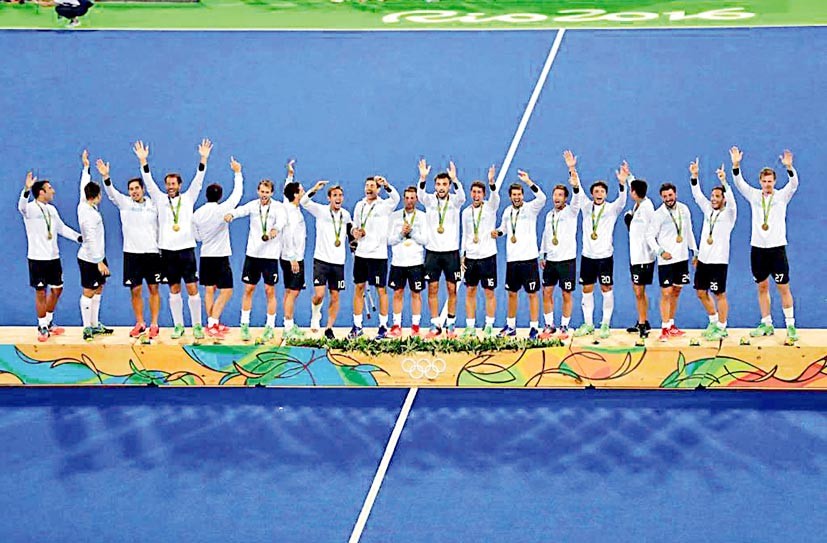
What transpired at the Olympic Hockey Centre of the Rio de Janeiro surprised everyone

Germany were the two time defending champions; Australia were the reigning world champions as well as FIH’s no 1 ranked team; and then there were the consistent Netherlands, the winners of 2015 Euro Nations and also the second ranked side.
The big three had shared all the golds over the last six Olympics. Things were not much different at the World Cup as the trio had won the five editions since 1994.
Only a fool would have put money on any other side! Spain had been the losing finalists in three Olympics/World Cups during the above mentioned period.
What transpired at the Olympic Hockey Centre of the Rio de Janeiro surprised everyone. None of the ‘three’ even got to the final. The Aussies perished in the quarter-finals.
The final was played between two nations not ranked among the top five and who had never appeared in an Olympic final before. Belgium had their previous semi-final appearance 88 years back. And Argentina had never reached that far. In fact, it was the first last-four qualification for the entire American continent barring the US’s third position out of total three sides at the 1932 Los Angeles Olympics.
Los Leones (The Lions), as the Argentine male hockey team is popularly known, were the deserving winners of a well-contested final.
Their campaign makes a fascinating reading. The South Americans’ previous best performance at the Olympics was 8th. At the last edition, they were 10th. For 2008 Games, they hadn’t even qualified.
At Rio, their show in the pool was hardly suggestive of things to come. They began with a 3-3 draw against the Netherlands after trailing 1-3 with 11 minutes left; they lost to India, let Germany tie them 4-4 with eight seconds left and beat Ireland 3-2 with a late goal in the last game.
In the quarter-final, it was a last minute penalty stroke goal that gave them a 2-1 victory against Spain.
But the Lions roared in the semi-final against the two time defending champions Germany, the only side that had not lost a single pool game.
In what was probably their greatest display in a global hockey event, Argentina swept aside the Germans 5-2 -- it was 5-0 at one stage.
The gold medal game between the two surprise packages was worthy of the planet’s biggest sporting extravaganza. Belgium had taken the lead in the 3rd minute.
Off Argentina’s first penalty corner in the 12th minute, everyone expected Gonzalo Peillat, Argentina’s penalty corner ace, scorer of his team’s first three goals in the semi-final through excellent conversions, to take the strike.
Instead, he made the back pass to the team captain Ibarra, who equalised.
Ignacio Ortiz followed three minutes later, taking a right-inside feed for a 2-1 lead. It didn’t take long for Peillat to get in the act as he made it 3-1 with a low drag flick for his tournament-leading 11th goal on Argentina’s second penalty corner seven minutes into the second quarter.
After some missed opportunities on both ends, Gauthier Boccard made it interesting. Displaying brilliant piece of stick work, he accelerated past three defenders to put Belgium back in the match 3-2 near the end of the third quarter. The last quarter saw Belgium look for the equaliser in desperation but the Argentineans didn’t budge. With less than three minutes remaining, Belgium pulled their goalkeeper out and it backfired.
Argentina’s Agustin Mazzilli intercepted a clearance in Belgium’s end, and put the ball in the empty net with eight seconds left. His teammates and the large number of Argentinean fans in blue and white erupted in joy as the celebrations began.
Despite losing the final, it was a dream journey for the Belgians. They didn’t appear at Olympics hockey for almost a quarter of a century: from 1980 to 2004. Their only two top-four positions had come a long time back: bronze in 1920 when only four teams competed and 4th position in 1928.
It was perhaps the most well-contested hockey tournament in the Olympics’ history. No less than 10 of the total 12 teams appeared capable of beating any other side on their day.
Only the hosts Brazil, making their Olympic debut, had entered without any hope.
Despite being the third biggest-selling event at the 2012 games in London, hockey narrowly avoided being dropped from the Olympic roster in 2013 over concerns that organisers were not doing enough to engage new fans.
The FIH responded by introducing a number of changes to the way hockey was played and broadcast. Those included 15-minute quarters and scheduling more time for television replays and analysis to showcase players’ skills with a ball moving at more than 160 kilometres an hour.
The Rio hockey tournament also featured quarter-finals, making it the last team sport to adopt the format at the Games.
The move was aimed at giving fans the thrills and excitement of an extended knock-out competition-and it succeeded.
The sport of hockey couldn’t have asked for a better show at the Olympics.
ijaz62@hotmail.com